NURS 3261: Grief Experience and Competency in Older Adult Care
VerifiedAdded on 2023/04/21
|10
|2806
|210
Report
AI Summary
This NURS 3261 assignment focuses on grief and final reflections in the context of nursing older adults. The first part involves reflecting on a personal experience with grief, relating it to a selected saying about grief, and discussing various manifestations of grief, drawing from personal experiences and course readings. The second part includes a self-evaluation using a competency survey related to geriatric skills and knowledge, comparing results from the beginning of the course to the end, and reflecting on how the course has impacted the student's understanding and abilities in caring for older adults. The assignment incorporates APA style formatting and references relevant scholarly articles.
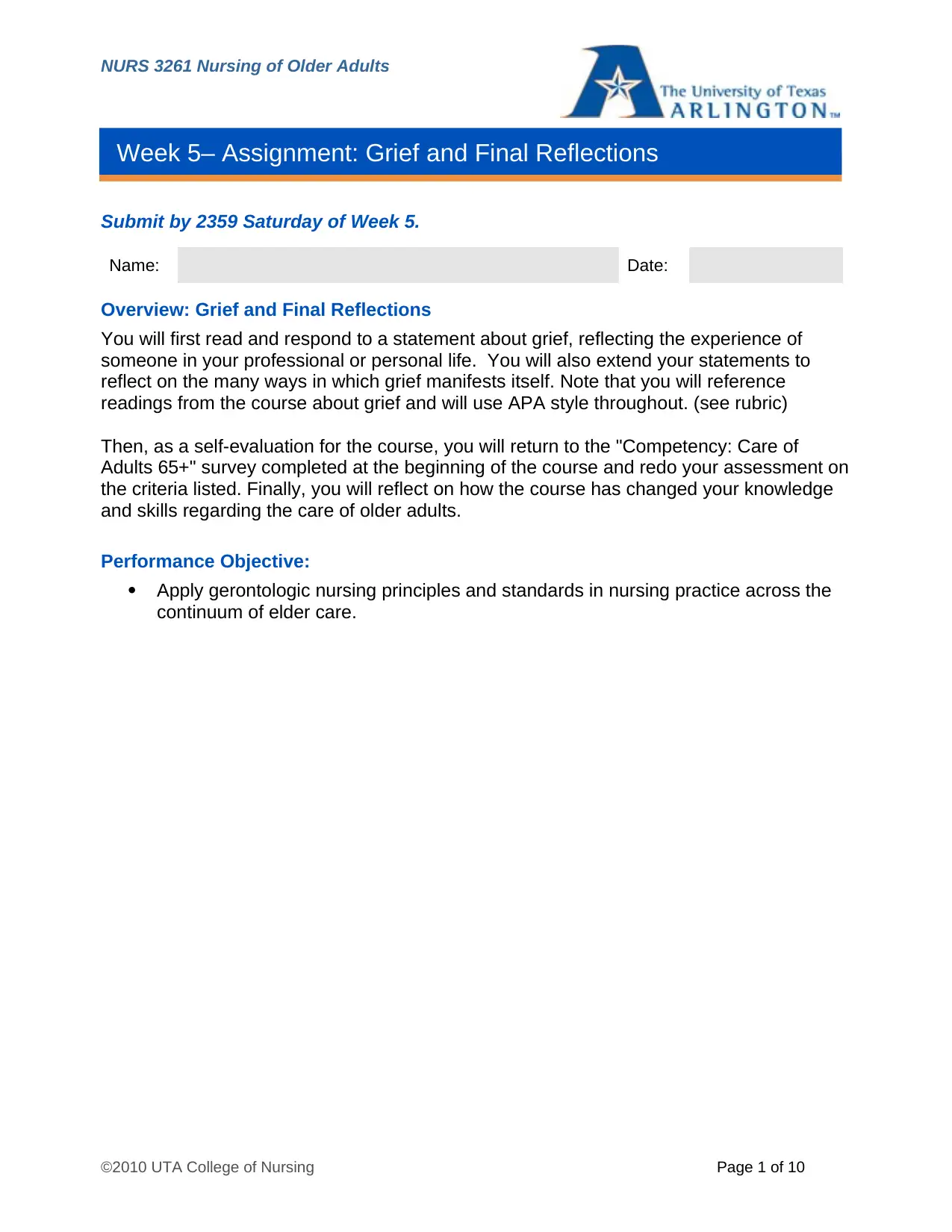
NURS 3261 Nursing of Older Adults
Submit by 2359 Saturday of Week 5.
Name: Date:
Overview: Grief and Final Reflections
You will first read and respond to a statement about grief, reflecting the experience of
someone in your professional or personal life. You will also extend your statements to
reflect on the many ways in which grief manifests itself. Note that you will reference
readings from the course about grief and will use APA style throughout. (see rubric)
Then, as a self-evaluation for the course, you will return to the "Competency: Care of
Adults 65+" survey completed at the beginning of the course and redo your assessment on
the criteria listed. Finally, you will reflect on how the course has changed your knowledge
and skills regarding the care of older adults.
Performance Objective:
Apply gerontologic nursing principles and standards in nursing practice across the
continuum of elder care.
©2010 UTA College of Nursing Page 1 of 10
Week 5– Assignment: Grief and Final Reflections
Submit by 2359 Saturday of Week 5.
Name: Date:
Overview: Grief and Final Reflections
You will first read and respond to a statement about grief, reflecting the experience of
someone in your professional or personal life. You will also extend your statements to
reflect on the many ways in which grief manifests itself. Note that you will reference
readings from the course about grief and will use APA style throughout. (see rubric)
Then, as a self-evaluation for the course, you will return to the "Competency: Care of
Adults 65+" survey completed at the beginning of the course and redo your assessment on
the criteria listed. Finally, you will reflect on how the course has changed your knowledge
and skills regarding the care of older adults.
Performance Objective:
Apply gerontologic nursing principles and standards in nursing practice across the
continuum of elder care.
©2010 UTA College of Nursing Page 1 of 10
Week 5– Assignment: Grief and Final Reflections
Paraphrase This Document
Need a fresh take? Get an instant paraphrase of this document with our AI Paraphraser
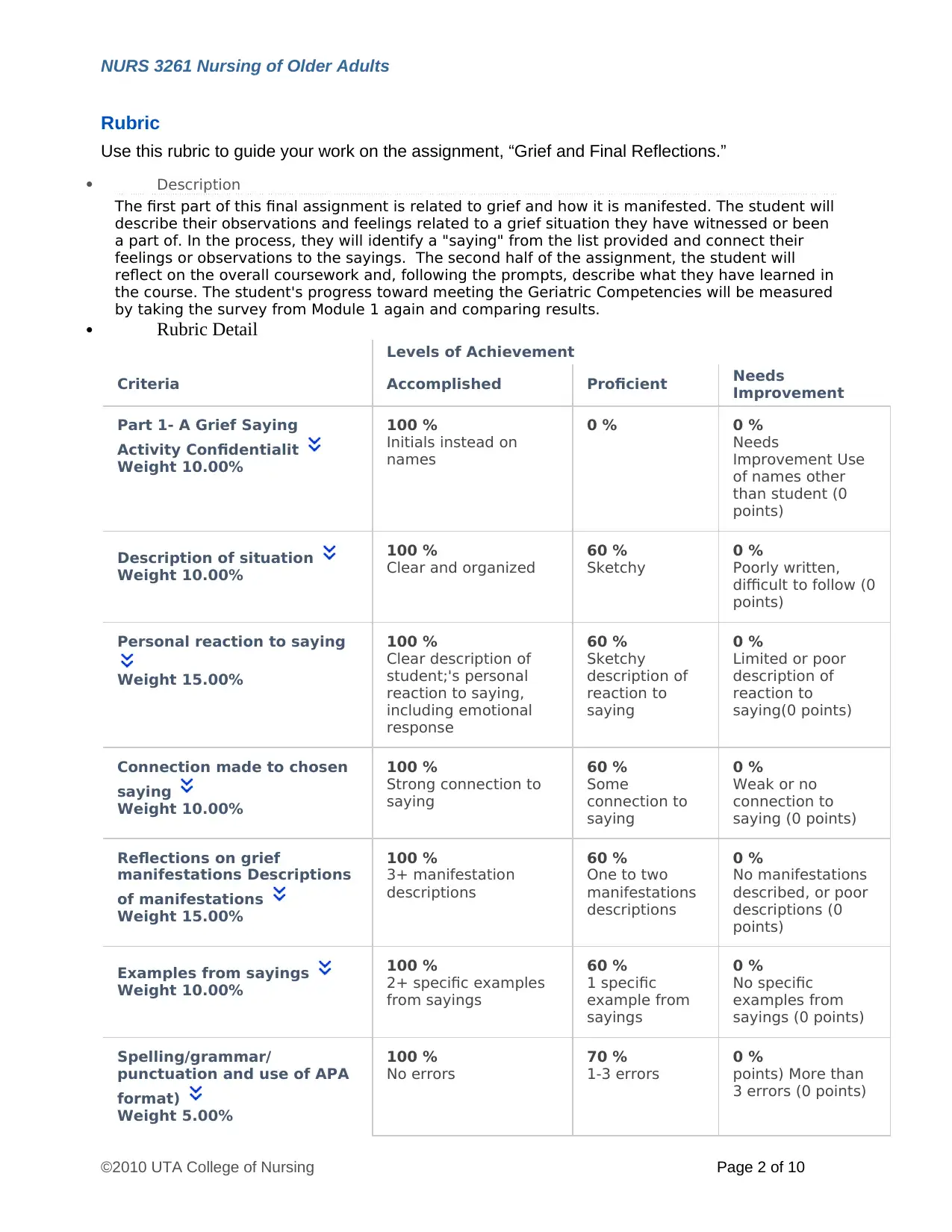
NURS 3261 Nursing of Older Adults
Rubric
Use this rubric to guide your work on the assignment, “Grief and Final Reflections.”
Description
The first part of this final assignment is related to grief and how it is manifested. The student will
describe their observations and feelings related to a grief situation they have witnessed or been
a part of. In the process, they will identify a "saying" from the list provided and connect their
feelings or observations to the sayings. The second half of the assignment, the student will
reflect on the overall coursework and, following the prompts, describe what they have learned in
the course. The student's progress toward meeting the Geriatric Competencies will be measured
by taking the survey from Module 1 again and comparing results.
Rubric Detail
Levels of Achievement
Criteria Accomplished Proficient Needs
Improvement
Part 1- A Grief Saying
Activity Confidentialit
Weight 10.00%
100 %
Initials instead on
names
0 % 0 %
Needs
Improvement Use
of names other
than student (0
points)
Description of situation
Weight 10.00%
100 %
Clear and organized
60 %
Sketchy
0 %
Poorly written,
difficult to follow (0
points)
Personal reaction to saying
Weight 15.00%
100 %
Clear description of
student;'s personal
reaction to saying,
including emotional
response
60 %
Sketchy
description of
reaction to
saying
0 %
Limited or poor
description of
reaction to
saying(0 points)
Connection made to chosen
saying
Weight 10.00%
100 %
Strong connection to
saying
60 %
Some
connection to
saying
0 %
Weak or no
connection to
saying (0 points)
Reflections on grief
manifestations Descriptions
of manifestations
Weight 15.00%
100 %
3+ manifestation
descriptions
60 %
One to two
manifestations
descriptions
0 %
No manifestations
described, or poor
descriptions (0
points)
Examples from sayings
Weight 10.00%
100 %
2+ specific examples
from sayings
60 %
1 specific
example from
sayings
0 %
No specific
examples from
sayings (0 points)
Spelling/grammar/
punctuation and use of APA
format)
Weight 5.00%
100 %
No errors
70 %
1-3 errors
0 %
points) More than
3 errors (0 points)
©2010 UTA College of Nursing Page 2 of 10
Rubric
Use this rubric to guide your work on the assignment, “Grief and Final Reflections.”
Description
The first part of this final assignment is related to grief and how it is manifested. The student will
describe their observations and feelings related to a grief situation they have witnessed or been
a part of. In the process, they will identify a "saying" from the list provided and connect their
feelings or observations to the sayings. The second half of the assignment, the student will
reflect on the overall coursework and, following the prompts, describe what they have learned in
the course. The student's progress toward meeting the Geriatric Competencies will be measured
by taking the survey from Module 1 again and comparing results.
Rubric Detail
Levels of Achievement
Criteria Accomplished Proficient Needs
Improvement
Part 1- A Grief Saying
Activity Confidentialit
Weight 10.00%
100 %
Initials instead on
names
0 % 0 %
Needs
Improvement Use
of names other
than student (0
points)
Description of situation
Weight 10.00%
100 %
Clear and organized
60 %
Sketchy
0 %
Poorly written,
difficult to follow (0
points)
Personal reaction to saying
Weight 15.00%
100 %
Clear description of
student;'s personal
reaction to saying,
including emotional
response
60 %
Sketchy
description of
reaction to
saying
0 %
Limited or poor
description of
reaction to
saying(0 points)
Connection made to chosen
saying
Weight 10.00%
100 %
Strong connection to
saying
60 %
Some
connection to
saying
0 %
Weak or no
connection to
saying (0 points)
Reflections on grief
manifestations Descriptions
of manifestations
Weight 15.00%
100 %
3+ manifestation
descriptions
60 %
One to two
manifestations
descriptions
0 %
No manifestations
described, or poor
descriptions (0
points)
Examples from sayings
Weight 10.00%
100 %
2+ specific examples
from sayings
60 %
1 specific
example from
sayings
0 %
No specific
examples from
sayings (0 points)
Spelling/grammar/
punctuation and use of APA
format)
Weight 5.00%
100 %
No errors
70 %
1-3 errors
0 %
points) More than
3 errors (0 points)
©2010 UTA College of Nursing Page 2 of 10
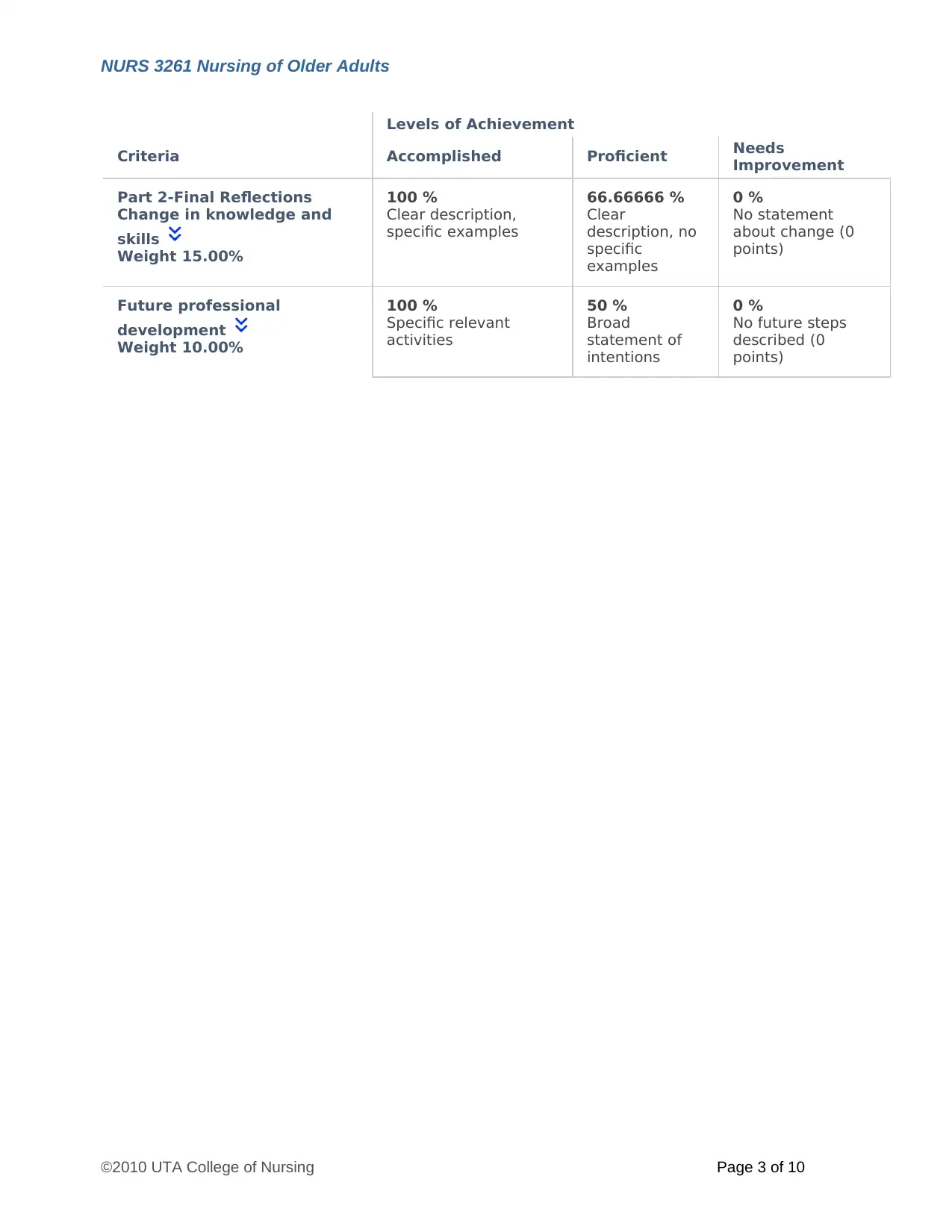
NURS 3261 Nursing of Older Adults
Levels of Achievement
Criteria Accomplished Proficient Needs
Improvement
Part 2-Final Reflections
Change in knowledge and
skills
Weight 15.00%
100 %
Clear description,
specific examples
66.66666 %
Clear
description, no
specific
examples
0 %
No statement
about change (0
points)
Future professional
development
Weight 10.00%
100 %
Specific relevant
activities
50 %
Broad
statement of
intentions
0 %
No future steps
described (0
points)
©2010 UTA College of Nursing Page 3 of 10
Levels of Achievement
Criteria Accomplished Proficient Needs
Improvement
Part 2-Final Reflections
Change in knowledge and
skills
Weight 15.00%
100 %
Clear description,
specific examples
66.66666 %
Clear
description, no
specific
examples
0 %
No statement
about change (0
points)
Future professional
development
Weight 10.00%
100 %
Specific relevant
activities
50 %
Broad
statement of
intentions
0 %
No future steps
described (0
points)
©2010 UTA College of Nursing Page 3 of 10
⊘ This is a preview!⊘
Do you want full access?
Subscribe today to unlock all pages.

Trusted by 1+ million students worldwide
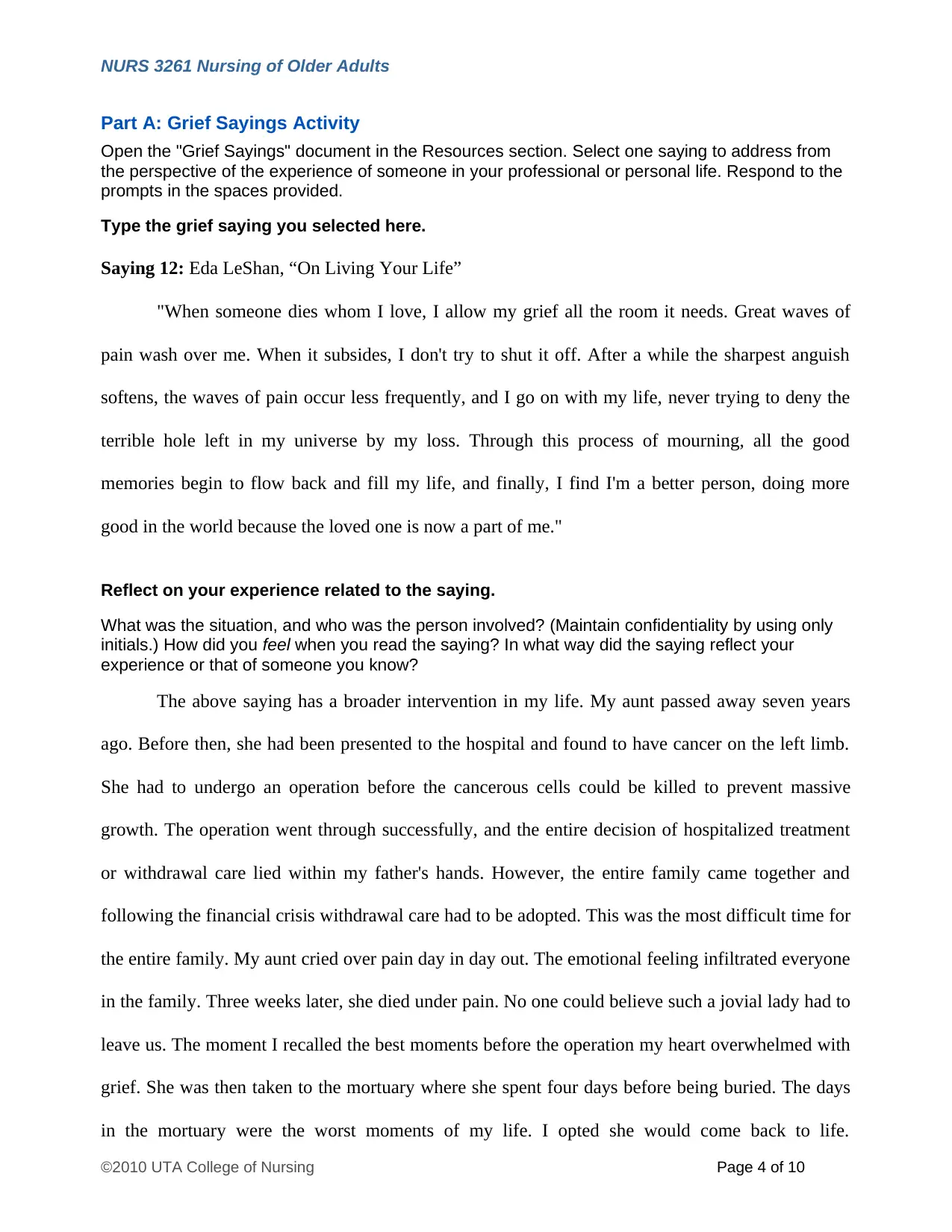
NURS 3261 Nursing of Older Adults
Part A: Grief Sayings Activity
Open the "Grief Sayings" document in the Resources section. Select one saying to address from
the perspective of the experience of someone in your professional or personal life. Respond to the
prompts in the spaces provided.
Type the grief saying you selected here.
Saying 12: Eda LeShan, “On Living Your Life”
"When someone dies whom I love, I allow my grief all the room it needs. Great waves of
pain wash over me. When it subsides, I don't try to shut it off. After a while the sharpest anguish
softens, the waves of pain occur less frequently, and I go on with my life, never trying to deny the
terrible hole left in my universe by my loss. Through this process of mourning, all the good
memories begin to flow back and fill my life, and finally, I find I'm a better person, doing more
good in the world because the loved one is now a part of me."
Reflect on your experience related to the saying.
What was the situation, and who was the person involved? (Maintain confidentiality by using only
initials.) How did you feel when you read the saying? In what way did the saying reflect your
experience or that of someone you know?
The above saying has a broader intervention in my life. My aunt passed away seven years
ago. Before then, she had been presented to the hospital and found to have cancer on the left limb.
She had to undergo an operation before the cancerous cells could be killed to prevent massive
growth. The operation went through successfully, and the entire decision of hospitalized treatment
or withdrawal care lied within my father's hands. However, the entire family came together and
following the financial crisis withdrawal care had to be adopted. This was the most difficult time for
the entire family. My aunt cried over pain day in day out. The emotional feeling infiltrated everyone
in the family. Three weeks later, she died under pain. No one could believe such a jovial lady had to
leave us. The moment I recalled the best moments before the operation my heart overwhelmed with
grief. She was then taken to the mortuary where she spent four days before being buried. The days
in the mortuary were the worst moments of my life. I opted she would come back to life.
©2010 UTA College of Nursing Page 4 of 10
Part A: Grief Sayings Activity
Open the "Grief Sayings" document in the Resources section. Select one saying to address from
the perspective of the experience of someone in your professional or personal life. Respond to the
prompts in the spaces provided.
Type the grief saying you selected here.
Saying 12: Eda LeShan, “On Living Your Life”
"When someone dies whom I love, I allow my grief all the room it needs. Great waves of
pain wash over me. When it subsides, I don't try to shut it off. After a while the sharpest anguish
softens, the waves of pain occur less frequently, and I go on with my life, never trying to deny the
terrible hole left in my universe by my loss. Through this process of mourning, all the good
memories begin to flow back and fill my life, and finally, I find I'm a better person, doing more
good in the world because the loved one is now a part of me."
Reflect on your experience related to the saying.
What was the situation, and who was the person involved? (Maintain confidentiality by using only
initials.) How did you feel when you read the saying? In what way did the saying reflect your
experience or that of someone you know?
The above saying has a broader intervention in my life. My aunt passed away seven years
ago. Before then, she had been presented to the hospital and found to have cancer on the left limb.
She had to undergo an operation before the cancerous cells could be killed to prevent massive
growth. The operation went through successfully, and the entire decision of hospitalized treatment
or withdrawal care lied within my father's hands. However, the entire family came together and
following the financial crisis withdrawal care had to be adopted. This was the most difficult time for
the entire family. My aunt cried over pain day in day out. The emotional feeling infiltrated everyone
in the family. Three weeks later, she died under pain. No one could believe such a jovial lady had to
leave us. The moment I recalled the best moments before the operation my heart overwhelmed with
grief. She was then taken to the mortuary where she spent four days before being buried. The days
in the mortuary were the worst moments of my life. I opted she would come back to life.
©2010 UTA College of Nursing Page 4 of 10
Paraphrase This Document
Need a fresh take? Get an instant paraphrase of this document with our AI Paraphraser
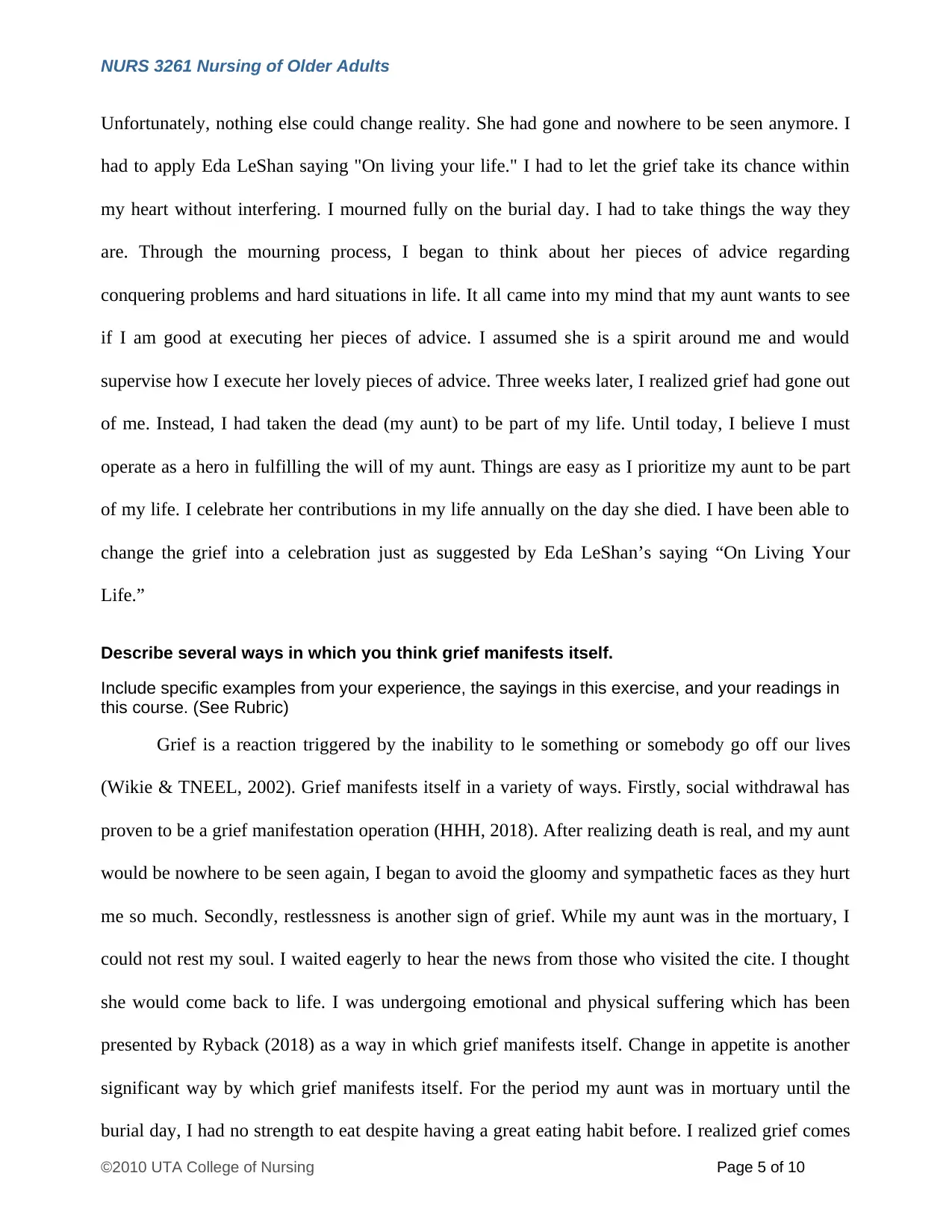
NURS 3261 Nursing of Older Adults
Unfortunately, nothing else could change reality. She had gone and nowhere to be seen anymore. I
had to apply Eda LeShan saying "On living your life." I had to let the grief take its chance within
my heart without interfering. I mourned fully on the burial day. I had to take things the way they
are. Through the mourning process, I began to think about her pieces of advice regarding
conquering problems and hard situations in life. It all came into my mind that my aunt wants to see
if I am good at executing her pieces of advice. I assumed she is a spirit around me and would
supervise how I execute her lovely pieces of advice. Three weeks later, I realized grief had gone out
of me. Instead, I had taken the dead (my aunt) to be part of my life. Until today, I believe I must
operate as a hero in fulfilling the will of my aunt. Things are easy as I prioritize my aunt to be part
of my life. I celebrate her contributions in my life annually on the day she died. I have been able to
change the grief into a celebration just as suggested by Eda LeShan’s saying “On Living Your
Life.”
Describe several ways in which you think grief manifests itself.
Include specific examples from your experience, the sayings in this exercise, and your readings in
this course. (See Rubric)
Grief is a reaction triggered by the inability to le something or somebody go off our lives
(Wikie & TNEEL, 2002). Grief manifests itself in a variety of ways. Firstly, social withdrawal has
proven to be a grief manifestation operation (HHH, 2018). After realizing death is real, and my aunt
would be nowhere to be seen again, I began to avoid the gloomy and sympathetic faces as they hurt
me so much. Secondly, restlessness is another sign of grief. While my aunt was in the mortuary, I
could not rest my soul. I waited eagerly to hear the news from those who visited the cite. I thought
she would come back to life. I was undergoing emotional and physical suffering which has been
presented by Ryback (2018) as a way in which grief manifests itself. Change in appetite is another
significant way by which grief manifests itself. For the period my aunt was in mortuary until the
burial day, I had no strength to eat despite having a great eating habit before. I realized grief comes
©2010 UTA College of Nursing Page 5 of 10
Unfortunately, nothing else could change reality. She had gone and nowhere to be seen anymore. I
had to apply Eda LeShan saying "On living your life." I had to let the grief take its chance within
my heart without interfering. I mourned fully on the burial day. I had to take things the way they
are. Through the mourning process, I began to think about her pieces of advice regarding
conquering problems and hard situations in life. It all came into my mind that my aunt wants to see
if I am good at executing her pieces of advice. I assumed she is a spirit around me and would
supervise how I execute her lovely pieces of advice. Three weeks later, I realized grief had gone out
of me. Instead, I had taken the dead (my aunt) to be part of my life. Until today, I believe I must
operate as a hero in fulfilling the will of my aunt. Things are easy as I prioritize my aunt to be part
of my life. I celebrate her contributions in my life annually on the day she died. I have been able to
change the grief into a celebration just as suggested by Eda LeShan’s saying “On Living Your
Life.”
Describe several ways in which you think grief manifests itself.
Include specific examples from your experience, the sayings in this exercise, and your readings in
this course. (See Rubric)
Grief is a reaction triggered by the inability to le something or somebody go off our lives
(Wikie & TNEEL, 2002). Grief manifests itself in a variety of ways. Firstly, social withdrawal has
proven to be a grief manifestation operation (HHH, 2018). After realizing death is real, and my aunt
would be nowhere to be seen again, I began to avoid the gloomy and sympathetic faces as they hurt
me so much. Secondly, restlessness is another sign of grief. While my aunt was in the mortuary, I
could not rest my soul. I waited eagerly to hear the news from those who visited the cite. I thought
she would come back to life. I was undergoing emotional and physical suffering which has been
presented by Ryback (2018) as a way in which grief manifests itself. Change in appetite is another
significant way by which grief manifests itself. For the period my aunt was in mortuary until the
burial day, I had no strength to eat despite having a great eating habit before. I realized grief comes
©2010 UTA College of Nursing Page 5 of 10
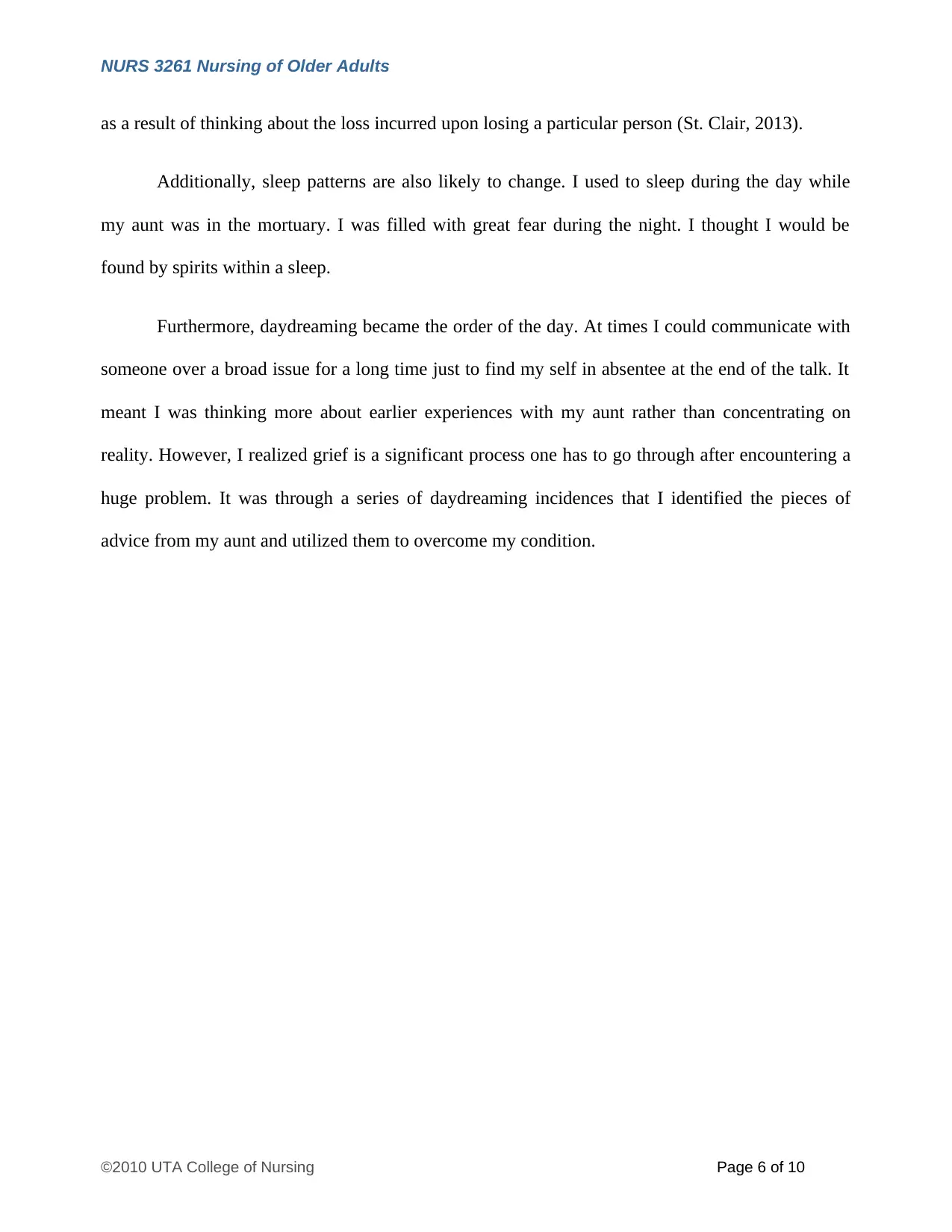
NURS 3261 Nursing of Older Adults
as a result of thinking about the loss incurred upon losing a particular person (St. Clair, 2013).
Additionally, sleep patterns are also likely to change. I used to sleep during the day while
my aunt was in the mortuary. I was filled with great fear during the night. I thought I would be
found by spirits within a sleep.
Furthermore, daydreaming became the order of the day. At times I could communicate with
someone over a broad issue for a long time just to find my self in absentee at the end of the talk. It
meant I was thinking more about earlier experiences with my aunt rather than concentrating on
reality. However, I realized grief is a significant process one has to go through after encountering a
huge problem. It was through a series of daydreaming incidences that I identified the pieces of
advice from my aunt and utilized them to overcome my condition.
©2010 UTA College of Nursing Page 6 of 10
as a result of thinking about the loss incurred upon losing a particular person (St. Clair, 2013).
Additionally, sleep patterns are also likely to change. I used to sleep during the day while
my aunt was in the mortuary. I was filled with great fear during the night. I thought I would be
found by spirits within a sleep.
Furthermore, daydreaming became the order of the day. At times I could communicate with
someone over a broad issue for a long time just to find my self in absentee at the end of the talk. It
meant I was thinking more about earlier experiences with my aunt rather than concentrating on
reality. However, I realized grief is a significant process one has to go through after encountering a
huge problem. It was through a series of daydreaming incidences that I identified the pieces of
advice from my aunt and utilized them to overcome my condition.
©2010 UTA College of Nursing Page 6 of 10
⊘ This is a preview!⊘
Do you want full access?
Subscribe today to unlock all pages.

Trusted by 1+ million students worldwide
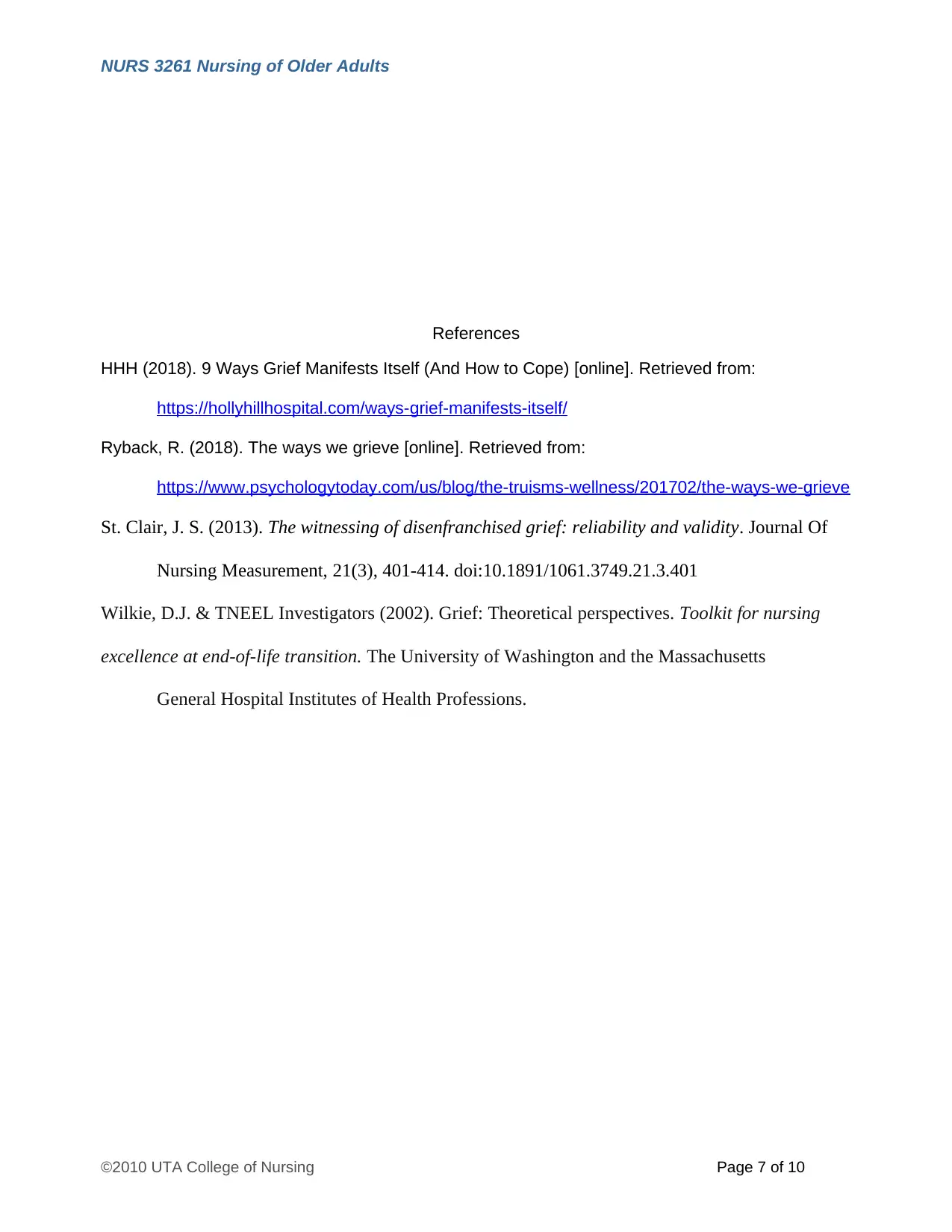
NURS 3261 Nursing of Older Adults
References
HHH (2018). 9 Ways Grief Manifests Itself (And How to Cope) [online]. Retrieved from:
https://hollyhillhospital.com/ways-grief-manifests-itself/
Ryback, R. (2018). The ways we grieve [online]. Retrieved from:
https://www.psychologytoday.com/us/blog/the-truisms-wellness/201702/the-ways-we-grieve
St. Clair, J. S. (2013). The witnessing of disenfranchised grief: reliability and validity. Journal Of
Nursing Measurement, 21(3), 401-414. doi:10.1891/1061.3749.21.3.401
Wilkie, D.J. & TNEEL Investigators (2002). Grief: Theoretical perspectives. Toolkit for nursing
excellence at end-of-life transition. The University of Washington and the Massachusetts
General Hospital Institutes of Health Professions.
©2010 UTA College of Nursing Page 7 of 10
References
HHH (2018). 9 Ways Grief Manifests Itself (And How to Cope) [online]. Retrieved from:
https://hollyhillhospital.com/ways-grief-manifests-itself/
Ryback, R. (2018). The ways we grieve [online]. Retrieved from:
https://www.psychologytoday.com/us/blog/the-truisms-wellness/201702/the-ways-we-grieve
St. Clair, J. S. (2013). The witnessing of disenfranchised grief: reliability and validity. Journal Of
Nursing Measurement, 21(3), 401-414. doi:10.1891/1061.3749.21.3.401
Wilkie, D.J. & TNEEL Investigators (2002). Grief: Theoretical perspectives. Toolkit for nursing
excellence at end-of-life transition. The University of Washington and the Massachusetts
General Hospital Institutes of Health Professions.
©2010 UTA College of Nursing Page 7 of 10
Paraphrase This Document
Need a fresh take? Get an instant paraphrase of this document with our AI Paraphraser
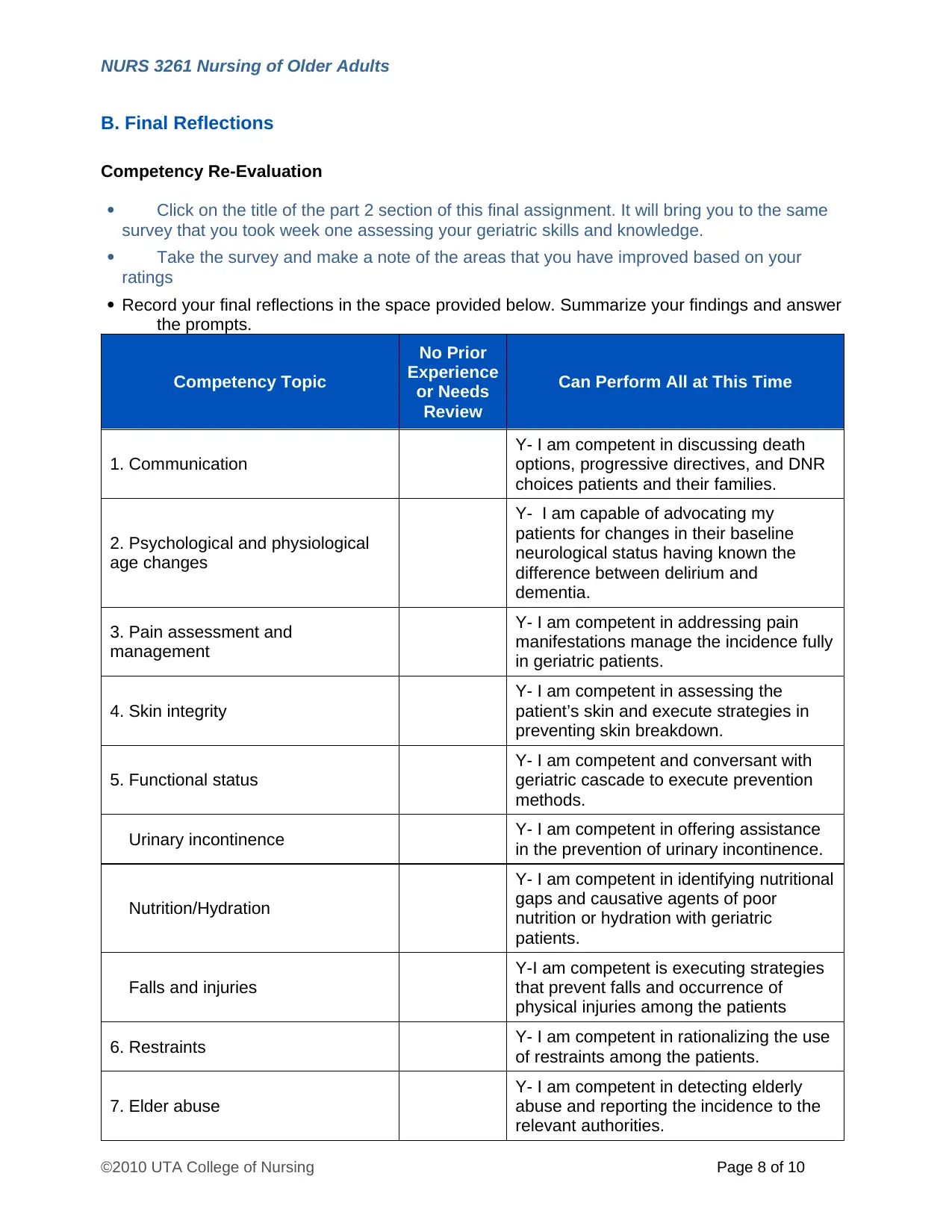
NURS 3261 Nursing of Older Adults
B. Final Reflections
Competency Re-Evaluation
Click on the title of the part 2 section of this final assignment. It will bring you to the same
survey that you took week one assessing your geriatric skills and knowledge.
Take the survey and make a note of the areas that you have improved based on your
ratings
Record your final reflections in the space provided below. Summarize your findings and answer
the prompts.
Competency Topic
No Prior
Experience
or Needs
Review
Can Perform All at This Time
1. Communication
Y- I am competent in discussing death
options, progressive directives, and DNR
choices patients and their families.
2. Psychological and physiological
age changes
Y- I am capable of advocating my
patients for changes in their baseline
neurological status having known the
difference between delirium and
dementia.
3. Pain assessment and
management
Y- I am competent in addressing pain
manifestations manage the incidence fully
in geriatric patients.
4. Skin integrity
Y- I am competent in assessing the
patient’s skin and execute strategies in
preventing skin breakdown.
5. Functional status
Y- I am competent and conversant with
geriatric cascade to execute prevention
methods.
Urinary incontinence Y- I am competent in offering assistance
in the prevention of urinary incontinence.
Nutrition/Hydration
Y- I am competent in identifying nutritional
gaps and causative agents of poor
nutrition or hydration with geriatric
patients.
Falls and injuries
Y-I am competent is executing strategies
that prevent falls and occurrence of
physical injuries among the patients
6. Restraints Y- I am competent in rationalizing the use
of restraints among the patients.
7. Elder abuse
Y- I am competent in detecting elderly
abuse and reporting the incidence to the
relevant authorities.
©2010 UTA College of Nursing Page 8 of 10
B. Final Reflections
Competency Re-Evaluation
Click on the title of the part 2 section of this final assignment. It will bring you to the same
survey that you took week one assessing your geriatric skills and knowledge.
Take the survey and make a note of the areas that you have improved based on your
ratings
Record your final reflections in the space provided below. Summarize your findings and answer
the prompts.
Competency Topic
No Prior
Experience
or Needs
Review
Can Perform All at This Time
1. Communication
Y- I am competent in discussing death
options, progressive directives, and DNR
choices patients and their families.
2. Psychological and physiological
age changes
Y- I am capable of advocating my
patients for changes in their baseline
neurological status having known the
difference between delirium and
dementia.
3. Pain assessment and
management
Y- I am competent in addressing pain
manifestations manage the incidence fully
in geriatric patients.
4. Skin integrity
Y- I am competent in assessing the
patient’s skin and execute strategies in
preventing skin breakdown.
5. Functional status
Y- I am competent and conversant with
geriatric cascade to execute prevention
methods.
Urinary incontinence Y- I am competent in offering assistance
in the prevention of urinary incontinence.
Nutrition/Hydration
Y- I am competent in identifying nutritional
gaps and causative agents of poor
nutrition or hydration with geriatric
patients.
Falls and injuries
Y-I am competent is executing strategies
that prevent falls and occurrence of
physical injuries among the patients
6. Restraints Y- I am competent in rationalizing the use
of restraints among the patients.
7. Elder abuse
Y- I am competent in detecting elderly
abuse and reporting the incidence to the
relevant authorities.
©2010 UTA College of Nursing Page 8 of 10
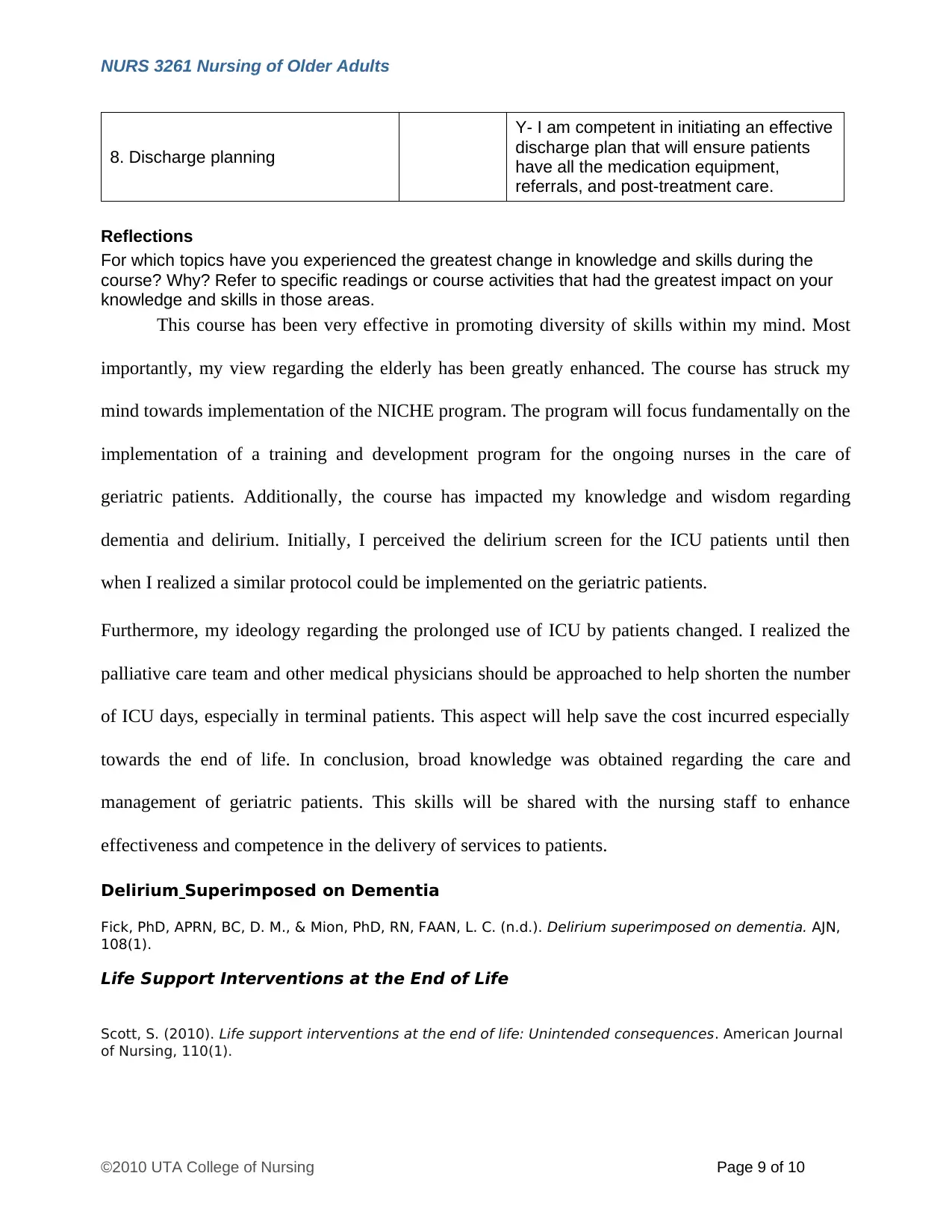
NURS 3261 Nursing of Older Adults
8. Discharge planning
Y- I am competent in initiating an effective
discharge plan that will ensure patients
have all the medication equipment,
referrals, and post-treatment care.
Reflections
For which topics have you experienced the greatest change in knowledge and skills during the
course? Why? Refer to specific readings or course activities that had the greatest impact on your
knowledge and skills in those areas.
This course has been very effective in promoting diversity of skills within my mind. Most
importantly, my view regarding the elderly has been greatly enhanced. The course has struck my
mind towards implementation of the NICHE program. The program will focus fundamentally on the
implementation of a training and development program for the ongoing nurses in the care of
geriatric patients. Additionally, the course has impacted my knowledge and wisdom regarding
dementia and delirium. Initially, I perceived the delirium screen for the ICU patients until then
when I realized a similar protocol could be implemented on the geriatric patients.
Furthermore, my ideology regarding the prolonged use of ICU by patients changed. I realized the
palliative care team and other medical physicians should be approached to help shorten the number
of ICU days, especially in terminal patients. This aspect will help save the cost incurred especially
towards the end of life. In conclusion, broad knowledge was obtained regarding the care and
management of geriatric patients. This skills will be shared with the nursing staff to enhance
effectiveness and competence in the delivery of services to patients.
Delirium Superimposed on Dementia
Fick, PhD, APRN, BC, D. M., & Mion, PhD, RN, FAAN, L. C. (n.d.). Delirium superimposed on dementia. AJN,
108(1).
Life Support Interventions at the End of Life
Scott, S. (2010). Life support interventions at the end of life: Unintended consequences. American Journal
of Nursing, 110(1).
©2010 UTA College of Nursing Page 9 of 10
8. Discharge planning
Y- I am competent in initiating an effective
discharge plan that will ensure patients
have all the medication equipment,
referrals, and post-treatment care.
Reflections
For which topics have you experienced the greatest change in knowledge and skills during the
course? Why? Refer to specific readings or course activities that had the greatest impact on your
knowledge and skills in those areas.
This course has been very effective in promoting diversity of skills within my mind. Most
importantly, my view regarding the elderly has been greatly enhanced. The course has struck my
mind towards implementation of the NICHE program. The program will focus fundamentally on the
implementation of a training and development program for the ongoing nurses in the care of
geriatric patients. Additionally, the course has impacted my knowledge and wisdom regarding
dementia and delirium. Initially, I perceived the delirium screen for the ICU patients until then
when I realized a similar protocol could be implemented on the geriatric patients.
Furthermore, my ideology regarding the prolonged use of ICU by patients changed. I realized the
palliative care team and other medical physicians should be approached to help shorten the number
of ICU days, especially in terminal patients. This aspect will help save the cost incurred especially
towards the end of life. In conclusion, broad knowledge was obtained regarding the care and
management of geriatric patients. This skills will be shared with the nursing staff to enhance
effectiveness and competence in the delivery of services to patients.
Delirium Superimposed on Dementia
Fick, PhD, APRN, BC, D. M., & Mion, PhD, RN, FAAN, L. C. (n.d.). Delirium superimposed on dementia. AJN,
108(1).
Life Support Interventions at the End of Life
Scott, S. (2010). Life support interventions at the end of life: Unintended consequences. American Journal
of Nursing, 110(1).
©2010 UTA College of Nursing Page 9 of 10
⊘ This is a preview!⊘
Do you want full access?
Subscribe today to unlock all pages.

Trusted by 1+ million students worldwide
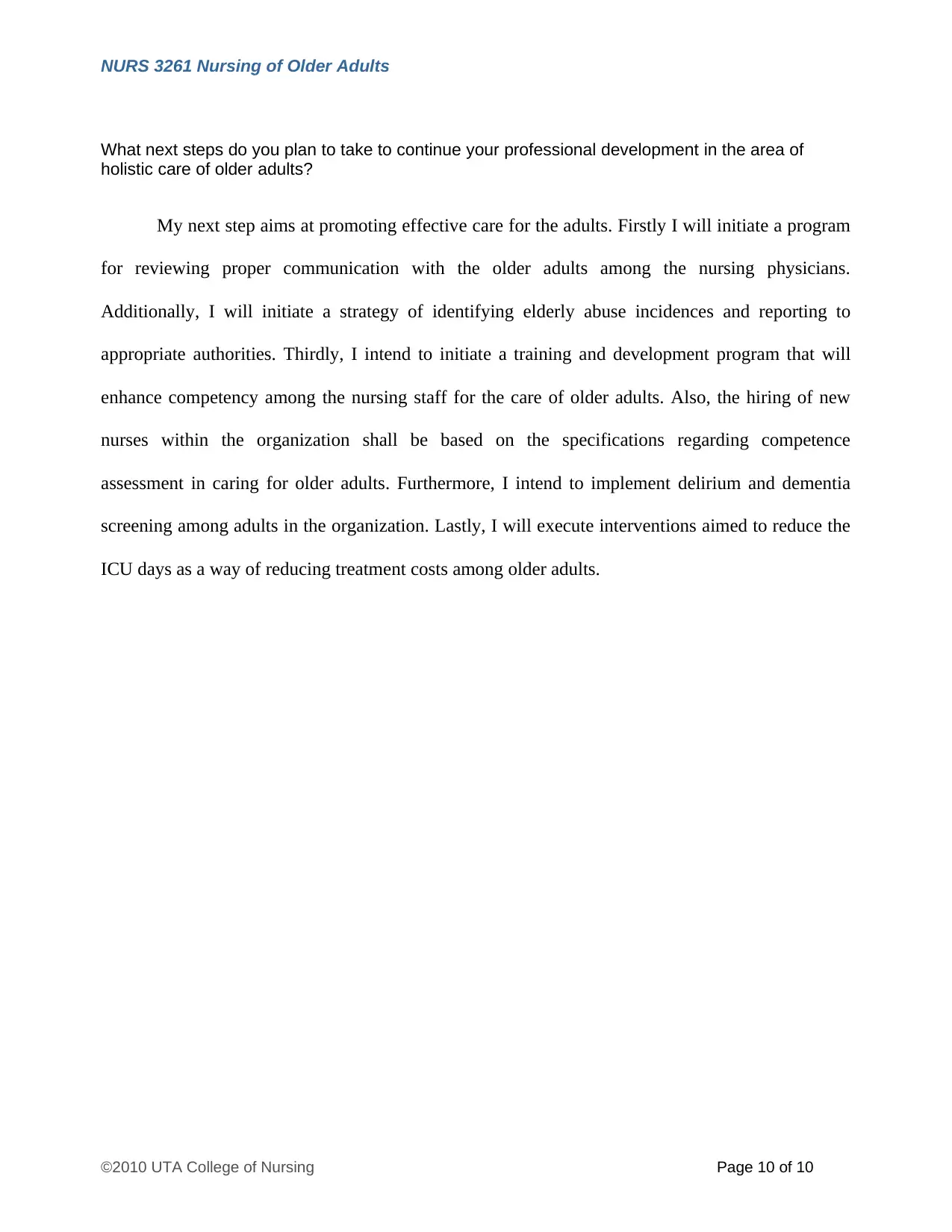
NURS 3261 Nursing of Older Adults
What next steps do you plan to take to continue your professional development in the area of
holistic care of older adults?
My next step aims at promoting effective care for the adults. Firstly I will initiate a program
for reviewing proper communication with the older adults among the nursing physicians.
Additionally, I will initiate a strategy of identifying elderly abuse incidences and reporting to
appropriate authorities. Thirdly, I intend to initiate a training and development program that will
enhance competency among the nursing staff for the care of older adults. Also, the hiring of new
nurses within the organization shall be based on the specifications regarding competence
assessment in caring for older adults. Furthermore, I intend to implement delirium and dementia
screening among adults in the organization. Lastly, I will execute interventions aimed to reduce the
ICU days as a way of reducing treatment costs among older adults.
©2010 UTA College of Nursing Page 10 of 10
What next steps do you plan to take to continue your professional development in the area of
holistic care of older adults?
My next step aims at promoting effective care for the adults. Firstly I will initiate a program
for reviewing proper communication with the older adults among the nursing physicians.
Additionally, I will initiate a strategy of identifying elderly abuse incidences and reporting to
appropriate authorities. Thirdly, I intend to initiate a training and development program that will
enhance competency among the nursing staff for the care of older adults. Also, the hiring of new
nurses within the organization shall be based on the specifications regarding competence
assessment in caring for older adults. Furthermore, I intend to implement delirium and dementia
screening among adults in the organization. Lastly, I will execute interventions aimed to reduce the
ICU days as a way of reducing treatment costs among older adults.
©2010 UTA College of Nursing Page 10 of 10
1 out of 10
Your All-in-One AI-Powered Toolkit for Academic Success.
+13062052269
info@desklib.com
Available 24*7 on WhatsApp / Email
![[object Object]](/_next/static/media/star-bottom.7253800d.svg)
Unlock your academic potential
Copyright © 2020–2026 A2Z Services. All Rights Reserved. Developed and managed by ZUCOL.